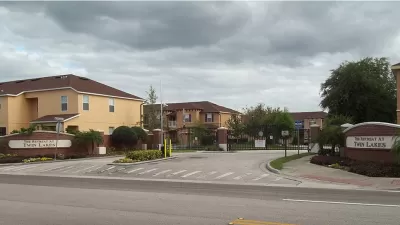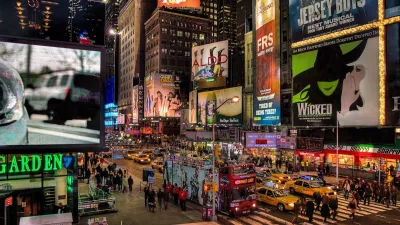Edward Blakely, co-author of “Fortress America: Gated Communities in the United States,” pens an opinion piece for The Washington Post looking at the detrimental psychology that exists in gated communities such as where Trayvon Martin died.
Blakely looks at the ways in which gated communities blur traditional lines of public and private in dangerous ways, which he extends outside the gates to "the nation's ideal of equality among its people."
Based on his extensive research across the country, and the statistics of local police departments, Blakely upends the supposed benefits of gated communities -- that they are more safe and more neighborly than other suburban communities. Aside from reduced rates of car theft, Blakely has found that, "gated communities do not have less crime than the suburbs from which they're walled off." He continues, "For many, the guards at the gate provide an artificial sense of safety. In our surveys of more than 1,000 residents of gated communities, many said they chose to live there because they traveled or worked long hours, so they had no time to meet neighbors and used the guards as their home security system."
For many of the six to nine million Americans living in single-family residences in gated suburban developments, their fortifications may induce the perception that a different set of rules apply inside the walls than outside of them. Furthermore, Blakeley argues that residents of gated communities often perceive those wall as freeing them from the communal responsibility to invest in larger public systems of education, healthcare, infrastructure, fire, and police.
"Barriers erode social stability and civic responsibility. Some make sense to protect special natural habitats, schools and similar places. But in cities and suburbs, we need to share space to make our communities stronger and safer."
FULL STORY: In gated communities, such as where Trayvon Martin died, a dangerous mind-set

Alabama: Trump Terminates Settlements for Black Communities Harmed By Raw Sewage
Trump deemed the landmark civil rights agreement “illegal DEI and environmental justice policy.”

Planetizen Federal Action Tracker
A weekly monitor of how Trump’s orders and actions are impacting planners and planning in America.

Why Should We Subsidize Public Transportation?
Many public transit agencies face financial stress due to rising costs, declining fare revenue, and declining subsidies. Transit advocates must provide a strong business case for increasing public transit funding.

Understanding Road Diets
An explainer from Momentum highlights the advantages of reducing vehicle lanes in favor of more bike, transit, and pedestrian infrastructure.

New California Law Regulates Warehouse Pollution
A new law tightens building and emissions regulations for large distribution warehouses to mitigate air pollution and traffic in surrounding communities.

Phoenix Announces Opening Date for Light Rail Extension
The South Central extension will connect South Phoenix to downtown and other major hubs starting on June 7.
Urban Design for Planners 1: Software Tools
This six-course series explores essential urban design concepts using open source software and equips planners with the tools they need to participate fully in the urban design process.
Planning for Universal Design
Learn the tools for implementing Universal Design in planning regulations.
Caltrans
Smith Gee Studio
Institute for Housing and Urban Development Studies (IHS)
City of Grandview
Harvard GSD Executive Education
Toledo-Lucas County Plan Commissions
Salt Lake City
NYU Wagner Graduate School of Public Service




























